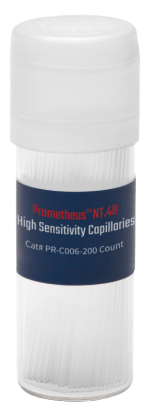Prometheus is the new gold standard
for protein stability characterizations
-
Prometheus
- Applications
- Systems
- Technology
- Software
- Consumables
With multi-parameter information on conformational and colloidal stability from Prometheus, you’ll see liabilities or stability enhancements that other technologies miss.
Only Prometheus enables you to measure thermal stability, aggregation, and particle sizing and dispersity in a single run – label-free, and without using lots of sample. Unveil hidden stability behaviors and feel confident that you’re progressing with the best candidates and conditions. Get trustworthy, high-resolution data on your protein’s stability from Prometheus.
Prometheus consistently delivers trustworthy, high-resolution stability characterization
- Collect precise, high-resolution data and reliable results every time
- Learn more about your protein samples without wasting sample
- Future-proof your lab and be prepared for any throughput or experiment type
- Get started right away with hassle-free software
Collect precise, high-resolution data and reliable results every time
Measuring with precision matters when the differences between your candidates are subtle. Prometheus delivers the high-resolution stability data you need to spot those differences and decide which candidates are best to work with moving forward.
Learn more about your protein samples without wasting sample
With multiple technologies collecting conformational and colloidal stability data from a single sample, you gain a deeper understanding of your molecule’s behavior when assessing your protein. Prometheus offers a combinatorial approach to selecting ideal drug candidates and conditions.
Future-proof your lab and be prepared for any throughput or experiment type
Prometheus works for large experiments with a single purpose, such as buffer screening; or for complex, multi-step processes like developability profiling. And when big projects come your way, get all your conformational and colloidal stability info in a hands-free, automated manner.
Get started right away with hassle-free software
It doesn’t take an expert to learn everything you need to know about your protein samples. Prometheus makes it easy to get started, both with operation and data analysis. Spend less time struggling to interpret your data and more time making decisions about your proteins.
Discover how Prometheus’s specificity, sensitivity, accuracy, precision, and limit of detection makes a difference in biologics stability characterization
Create biologics developability profiles during early-stage screening.
Perform comparability studies to ensure that changes to manufacturing processes or sites don’t affect the drug product.
Use combinatorial stability parameters to find the optimal storage buffers for your drug candidates.
Where Prometheus is making a difference
Scientific areas
Therapeutic drug discovery & development
Create biologics developability profiles during early-stage screening.
Structural biology
Maximize protein solubility and stability before crystallization or Cryo-EM to improve the quality of your structural data
Techniques
Thermal shift assays
Screen for small molecule drug candidate compounds that increase the stability of your target protein, indicating an interaction
Self-association determination
Determine if a protein is more likely to self-associate, and therefore become viscous or aggregated
Chemical stability assessment
Accelerated stability studies
Extrapolate the long-term stability of your proteins with high-temp isothermal measurements
Whatever your research goals, there’s a system for you
There are several versions of Prometheus available for whatever your lab needs. They all provide the highest-resolution, highest-quality data, and do so on an intuitive and user-friendly software interface.
Find the right configuration for your lab.
Prometheus Panta
Prometheus Panta plus Robotic Autosampler
Prometheus Panta
Choose Prometheus Panta for full stability and developability profiles for your proteins, including thermal stability, particle sizing and purity, and aggregation
Prometheus Panta plus Robotic Autosampler
For high-throughput developability or formulations screening, turn to the Prometheus Panta with the Robotic Autosampler to get full stability profiles on up to 1536 samples, hands-free
Tackle challenging stability characterizations with multiple technologies in one instrument
Prometheus uses a number of technologies to characterize thermal unfolding, particle sizing, and aggregation. Each one tells a different story about stability, and is used for a variety of applications. But they have one thing in common — they are all label-free.
nanoDSF
When is it useful?
For monitoring thermal stability during biologics formulation, developability, production, and manufacturing; evaluating target-ligand complexes before affinity-based screening; or optimizing conditions for structural biology conditions
What does it do?
It measures thermal or chemical unfolding label-free, under native conditions by detecting changes in a protein’s intrinsic fluorescence during a thermal ramp or in the presence of a chemical denaturant
Dynamic Light Scattering (DLS)
When is it useful?
For screening recombinant proteins expressed from different constructs, biologics formulation screening, sample optimization for biophysical assays, and characterization of self-interactions
What does it do?
It determines the size of the molecules in your sample prep, and whether or not there are multiple sample sizes present
Static Light Scattering (SLS)
When is it useful?
For determining if complexes have formed, measuring how much genetic material a viral vector contains, or extrapolating how proteins will interact with themselves at high concentrations.
What does it do?
It looks at the overall average scattering intensity of your solution and correlates that to the molecular weight of your particles
Backreflection
When is it useful?
It indicates the presence of large aggregates by measuring light intensity loss due to scattering, i.e., turbidity
What does it do?
It determines aggregation status by measuring light intensity loss due to scattering
Parameters measured by Prometheus systems
Prometheus provides a wealth of information about the stability of your proteins. Many of these parameters are collected concurrently, without the need for additional experimental set-up. Get the most information out of your protein samples. Learn more about which parameters you get from Prometheus.
PDI
Polydispersity index represents distribution of size populations
Low PDI values indicate prep is free of large aggregates or multiple protein populations
Tm (for 330 nm, 350 nm, and ratio)
Melting temperature, or point at which 50% is unfolded
Ranking candidates by melting temperature is a well-established method for finding most thermostable constructs, considered better selections for further experimentation
Tonset (for ratio)
Temperature at which thermal unfolding begins, measured from fluorescence ratio
More thermostable proteins have higher onset of unfolding; furthermore, proteins with Tonset values close to their Tms are more uniformly folded and therefore more stable
Ea(*parameter derived from data)
Activation energy of unfolding (*parameter derived from data)
The more energy required to drive unfolding of a protein, the more stable it is
Reversibility of unfolding
Point at which irreversibility happens when unfolding, thereby making aggregation more likely
Engineer or formulate proteins to avoid or delay irreversible unfolding and loss of function
rH
Hydrodynamic radius shows size of particle in solvated state
Establishes baseline sizing parameter about a protein of interest, used to compare before and after changes to formulation buffer or production processes
Molecular weight
Average molecular weight of all particles in solution Establishes baseline sizing parameter about a protein of interest, used to compare before and after changes to formulation buffer or purification processesTsize
Temperature at which average particle size begins to increase – measured from from growth of rH in cumulants fit Indicates temperature at which protein begins to unfold, thereby indicating how stable it is; higher Tsize indicates greater colloidal stabilityAverage scattering intensity
Identifies if concentration is too high or low for proper size distribution analysis; high-quality DLS data starts with good signal qualityTturbidity
Onset temperature of turbidity, or large aggregates >12.5 nm radius
Large, amorphous aggregates contaminate preps and lower safety, activity, and stability of a prep; aim for high Tturbidity values or no change in turbidity signal
Tscattering
Temperature at which scattering intensity begins to change, indicating increased size and aggregation
Additional parameter for evaluating colloidal and conformational destabilization of a protein; higher Tscattering means a more stable protein
B22
Second virial coefficient used to extrapolate self-association behavior at higher concentrations
Negative B22 values indicate propensity towards self-interaction, and therefore greater likelihood of aggregating at the high concentrations required for clinical use
kD
Diffusion interaction identifies onset of unfolding and impact on colloidal stability
Negative kD values indicate propensity towards self-interaction, and therefore greater likelihood of aggregating at the high concentrations required for clinical use
Cm or C50
The concentration of a denaturant that causes 50% of proteins to unfold
Higher Cms indicate a more stable protein
ΔG
The Gibbs free energy of protein unfolding, a thermodynamic measure of the likelihood a folding event may occur
Proteins with more negative ΔG are more likely to fold. Changes in the Gibbs free energy are measured with ΔΔG, which shows the relative stability of a protein at various concentrations or conditions.
What sets Prometheus apart when it comes to data quality
Prometheus isn’t the only instrument around that provides the data you need for your work. So why choose it? Prometheus offers the highest-quality data so you never doubt the quality of your measurements, and make decisions about your proteins with confidence.
Precision
Provide replicate measurements with minimal deviation between individual samples
High resolution
Broad dynamic range
Measure samples at high or low concentrations
High level of sensitivity
See meaningful transitions even at low sample concentrations
High level of specificity
Distinguish the signal of your protein of interest from the signal of the buffer or matrix, without the need for a blank or calibration
Software that gives you clear, actionable results
Getting started with protein stability experiments is simple with Prometheus software. Control software is designed for easy set-up of experiments and allows you to view data acquisition in real time. And powerful Analysis software enables you to sort, highlight, and rank the parameters that tell you about your proteins of interest. All software has a clean interface and intuitive user experience, so you’re ready to get started as soon as your Prometheus fires up.
Get consistency with high performance consumables

All you need for Prometheus experiments are capillaries. Prometheus capillaries are manufactured using the same stringent protocols used for diagnostic-grade materials to ensure the best results. They come individually or in chips spaced for use with 384-well plates.

